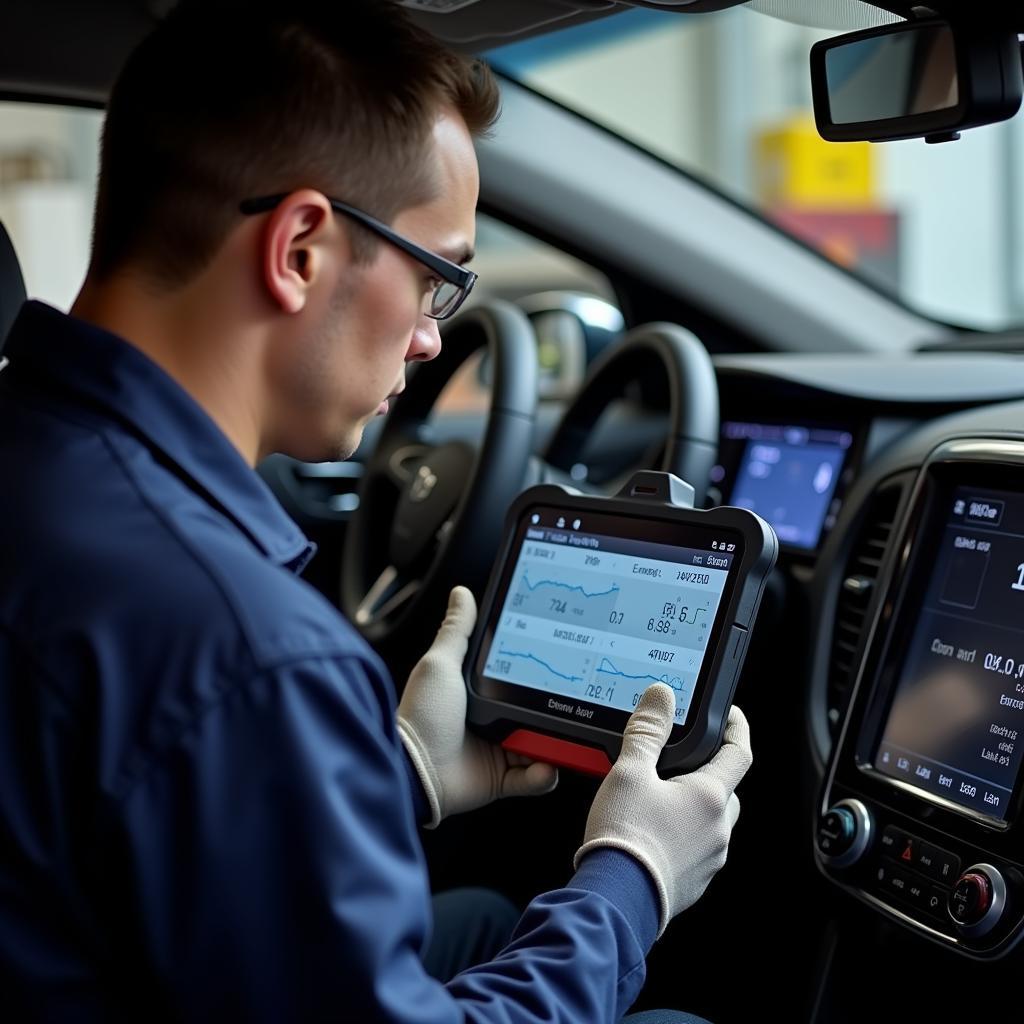Electric cars are rapidly changing the automotive landscape. This shift from traditional combustion engines to electric motors impacts not only how we drive but also how we diagnose and repair these vehicles. Understanding the unique diagnostic needs of electric and car systems is crucial for both car owners and automotive professionals.
With the rise of electric vehicles, the need for specialized diagnostic tools has never been greater. Traditional scanners often fall short when it comes to accessing the intricate systems of an electric vehicle. This is where Dealer Scanners come into play, offering advanced capabilities to pinpoint issues within the electric motor, battery system, and other EV-specific components. Choosing the right scanner can significantly improve diagnostic efficiency and reduce repair time. See our list of electric car brands for more information on specific makes and models.
Electric Car Diagnostics: A New Era
Electric cars present a unique set of diagnostic challenges compared to their gasoline-powered counterparts. The high-voltage systems, complex battery management, and intricate electronic control units require specialized knowledge and equipment. Understanding these differences is fundamental to effective diagnostics.
Key Differences in Diagnostic Procedures
One key difference lies in the safety precautions required when working with high-voltage systems. Technicians need to be trained and equipped to handle these systems safely. Furthermore, the diagnostic software used needs to be compatible with the specific electric car model and be able to access the data from the various electronic control units. The future of diagnostics involves a deeper understanding of software and data analysis, not just mechanical components.
Another crucial aspect is the battery management system (BMS). This system monitors and controls the charging and discharging of the battery, ensuring optimal performance and longevity. Diagnosing issues within the BMS requires specialized knowledge and access to specific data parameters. Knowing how to interpret this data is essential for accurate diagnosis. What are the main components of an electric car’s powertrain? The key components include the electric motor, battery pack, power electronics controller, and onboard charger.
Choosing the Right Dealer Scanner for Electric and Car Systems
Investing in a high-quality Dealer Scanner is essential for effectively diagnosing electric and car systems. These scanners provide access to manufacturer-specific data, allowing technicians to pinpoint issues with greater precision. They also offer advanced features like bi-directional control, allowing technicians to test individual components and systems.
Essential Features of a Dealer Scanner for EVs
Look for a Dealer Scanner that supports the specific make and model of the electric car you are working with. Ensure it has the capability to access the battery management system data and other EV-specific parameters. Furthermore, consider the scanner’s software updates and technical support. Staying current with the latest software is crucial for accurate diagnostics. Check the current BYD electric car price for an example of a popular EV brand.
 Dealer Scanner for EV Diagnostics: Advanced Tools for Accurate Results
Dealer Scanner for EV Diagnostics: Advanced Tools for Accurate Results
“Investing in the right diagnostic equipment is not just an expense, it’s an investment in the future of your business,” says John Smith, Lead Automotive Engineer at EV Diagnostics Inc. His sentiment highlights the importance of staying ahead of the curve in the evolving automotive landscape.
Future Trends in Electric and Car Diagnostics
As electric car technology continues to evolve, so too will the diagnostic tools and techniques required to maintain them. We can expect to see more sophisticated software, cloud-based diagnostics, and the increased use of artificial intelligence in identifying and resolving issues. Staying informed about these trends is vital for anyone working in the automotive industry.
The Role of Software and Data Analysis
The future of diagnostics will rely heavily on software and data analysis. Technicians will need to be proficient in interpreting complex data sets and using software to identify patterns and anomalies. This shift towards data-driven diagnostics underscores the importance of continuous learning and adaptation in the automotive field. For information about Toyota’s foray into electric vehicles, check our article on the Toyota electric car.
“The ability to analyze and interpret data is becoming just as important as traditional mechanical skills,” says Maria Garcia, Senior Technician at Green Auto Repair. Her words emphasize the changing skillset required for automotive professionals in the age of electric vehicles.
In conclusion, the world of electric and car diagnostics is evolving rapidly. Staying ahead of the curve requires a commitment to continuous learning and investing in the right tools and training. By embracing these changes, automotive professionals can ensure they are equipped to handle the challenges and opportunities presented by the electric car revolution. What does this mean for car owners and mechanics? It means a greater emphasis on specialized knowledge and the use of advanced diagnostic tools.
FAQ:
- What is a Dealer Scanner?
- Why is a Dealer Scanner important for electric cars?
- What are the key differences between diagnosing an electric car and a gasoline car?
- What are some common problems with electric car batteries?
- How can I find a qualified technician to diagnose my electric car?
- What is the average cost of an electric car diagnostic?
- What are some future trends in electric car diagnostics?
You can also find more information on Care and Share and Dude Where’s My Car Cast.
Need further assistance? Contact us via WhatsApp: +1(641)206-8880, Email: [email protected] or visit us at 276 Reock St, City of Orange, NJ 07050, United States. Our customer service team is available 24/7.


